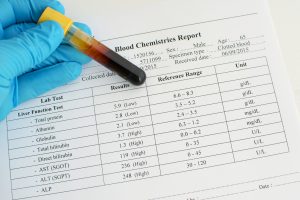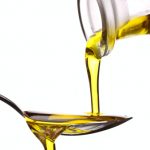 Elevated bilirubin is a result of hemoglobin breakdown in the old red blood cells. When hemoglobin is broken down, bilirubin is produced, which travels through the body to the liver to be turned into bile. This bile is then stored in the gallbladder or eliminated in your stool. Some of this bile will remain in the blood, which is normal.
Elevated bilirubin is a result of hemoglobin breakdown in the old red blood cells. When hemoglobin is broken down, bilirubin is produced, which travels through the body to the liver to be turned into bile. This bile is then stored in the gallbladder or eliminated in your stool. Some of this bile will remain in the blood, which is normal.
If you’re wondering what is considered high bilirubin levels in adults, it’s anything above 1.9 mg, as the normal readings should be between 0.3 and 1.9 mg.
Advertisement
There are many different conditions that can contribute to elevated bilirubin, which we will explain further down – along with some home remedies that can help lower your bilirubin levels.
Causes of elevated bilirubin in adults
Liver disease: It is the liver’s job to process bilirubin and convert it into bile. When a person has liver disease, the ability of the liver to complete this process becomes impaired. This can cause bilirubin to build up. Liver diseases include viral hepatitis, cirrhosis, and Gilbert syndrome.
Bile duct and gallbladder disease: Bile made from bilirubin in the liver is sent to the gallbladder. If your gallbladder is sick or if you have a bile duct blockage, this can cause elevated levels of bilirubin. Other conditions that can lead to elevated bilirubin include tumors of the gallbladder, pancreas, or bile duct.
Hemolytic anemia: In this type of anemia, red blood cells die prematurely. This leads to a greater amount of destroyed red blood cells producing bilirubin. Diseases that can contribute to hemolytic anemia include lupus, sickle cell anemia, lymphoma, or leukemia.
Medications: An elevated level of bilirubin can be a side effect of some medications. Some drugs lower the uptake of bilirubin in the liver, raising the levels. Other drugs affect the secretion of bile, further contributing to the elevated levels of bilirubin.
Transfusion reaction: During a blood transfusion, you can have an allergic reaction that causes the immune system to destroy red blood cells. When a large amount of red blood cells becomes destroyed, it results in higher bilirubin levels.
Home remedies to treat elevated bilirubin levels
 Eat nutritious foods: Nutritious foods promote energy and help maintain a healthy liver function. A healthy working liver promotes toxin removal and can process bilirubin into bile. Healthy foods include whole grains, fish, fruits and vegetables, olive oil, and low fat dairy.
Eat nutritious foods: Nutritious foods promote energy and help maintain a healthy liver function. A healthy working liver promotes toxin removal and can process bilirubin into bile. Healthy foods include whole grains, fish, fruits and vegetables, olive oil, and low fat dairy.
Eat more fiber: Fiber can also help rejuvenate the liver. The recommended fiber intake is 35 grams for women and 25 grams for men. Studies have shown that a healthy intake of fiber can be successful in lowering bilirubin levels.
Choose red vegetables and fruits: The compound that gives fruits and vegetables their red color also works to lower bilirubin levels. Tomatoes have the highest level of this compound, so enjoying them regularly can maintain healthy bilirubin levels.
Avoid unhealthy foods: Sugar and fat can wreak havoc on your liver, causing sickness and impairing its function. When your liver cannot function well, bilirubin levels can go up. Avoid fast food, fried food, processed food, and sugary foods in order to maintain a healthy liver.
Eat barley: Barley has been shown to promote toxin removal. An easy way to enjoy barley is drinking a roasted barley powder dissolved in water with some honey.
Eat radishes: Radishes have been shown to help improve liver function – they are often used to treat jaundice. You can eat radishes or even drink radish juice to get in an adequate amount for a healthy liver support.
What you should know about a bilirubin test
To test for bilirubin, your doctor will request your blood sample. These results will tell your doctor direct, indirect, and total bilirubin. Indirect bilirubin does not dissolve in water and travels to the liver. Direct bilirubin dissolves in water and is made by the liver from indirect bilirubin. Normal bilirubin results are 1.2 mg in adults and 1 mg for those under 18.
Results may be affected by gender, exercise, diet, or medications. It’s important to tell your doctor about any medications you are on, workouts you perform, or foods you eat, so the results can be interpreted correctly.
Advertisement
Elevated bilirubin levels may indicate a problem with your liver along with other possible health issues.
Bilirubin tests are often conducted to check liver function, to determine any blocked bile ducts, to diagnose various conditions, and to make decisions about treatment for newborns with jaundice.
You do not need to undergo any special preparation prior to a bilirubin test, but do inform your doctor if you are on any medications, have any allergies to medications, have had a bleeding problem or take blood thinners, and if you may be or are pregnant.
